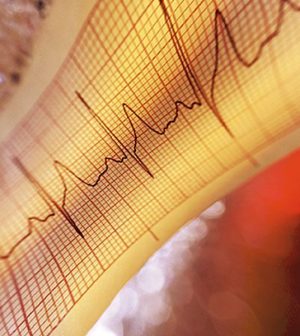- Could Your Grocery Store Meat Be Causing Recurring UTIs?
- Are You Making This Expensive Thermostat Error This Winter?
- Recognizing the Signs of Hypothyroidism
- 10 Strategies to Overcome Insomnia
- Could Artificial Sweeteners Be Aging the Brain Faster?
- Techniques for Soothing Your Nervous System
- Does the Water in Your House Smell Funny? Here’s Why
- Can a Daily Dose of Apple Cider Vinegar Actually Aid Weight Loss?
- 6 Health Beverages That Can Actually Spike Your Blood Sugar
- Treatment Options for Social Anxiety Disorder
Blind People Are Better at Sensing Their Heartbeats

People who are blind are better at sensing their own heartbeats, according to a new study that found blindness appears to heighten one’s ability to feel signals from the inner body.
Researchers from Sweden and Poland tested this in a study of 36 blind individuals and the same number of sighted people.
Each was asked to count their heartbeats without checking their pulse or touching their body.
Using a pulse oximeter, the researchers simultaneously recorded participants’ actual heartbeats. Then, they compared the reported numbers with those actually recorded.
Among participants who were blind, average accuracy was 0.78, while the sighted group averaged 0.63 on a scale where 1.0 represented a perfect score.
“The blind participants were much better at counting their own heartbeats than the sighted participants in our study and in several previous studies,” said lead researcher Dominika Radziun, a doctoral student in neuroscience at the Karolinska Institute in Sweden.
“It gives us important information about the brain’s plasticity and how the loss of one sense can enhance others, in this case the ability to feel what happens inside your own body,” Radziun explained in an institute news release.
This ability to sense heartbeats may provide an advantage when it comes to emotional processing, the study authors said. Prior studies have linked people’s ability to sense the body’s internal state to how well they perceive emotions in themselves and others.
“We know that heart signals and emotions are closely interlinked; for example our hearts beat faster when we experience fear,” Radziun said. “It is possible that blind individuals’ enhanced sensitivity to signals from their own heart also impacts their emotional experiences.”
The research group plans to continue studying how blind individuals perceive their own bodies, examining if structural changes in the visual cortex, the brain region normally responsible for vision, may explain the increased ability to sense signals from the inside of the body.
The Polish researchers were from Jagiellonian University in Krakow.
The study findings were published online recently in the Journal of Experimental Psychology: General.
More information
The U.S. National Eye Institute has more on how the brain changes to enhance other senses in blind people.
SOURCE: Karolinska Institute, news release, March 24, 2023
Source: HealthDay
Copyright © 2026 HealthDay. All rights reserved.










